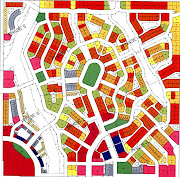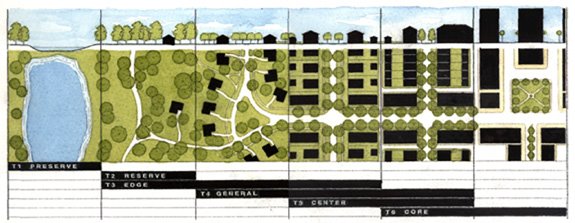A Provocative Thesis from Someone Not Unqualified* to Provoke Us:
Is THIS the Next Slum?
The universal definition of a McMansion is a house quite a bit larger than any one you'd want to live in.
Chris Leinberber has a written a very provocative essay in this month's (March 2008) issue of "The Atlantic." Leinberger concludes that in 25 years American cities may look very different from the way they look now, with vibrant urban cores surrounded by suburbs where the former McMansions have been broken into flats into which multiple families of the the poor have been crowded.
Looking beyond the current subprime mortgage crisis, Leinberger writes “a structural change is under way in the housing market--a major shift in the way many Americans want to live and work. It has shaped the current downturn, steering some of the worst problems away from the cities and toward the suburban fringes. And its effects will be felt more strongly, and more broadly, as the years pass. Its ultimate impact on the suburbs, and the cities, will be profound.”
In support of his thesis Leinburger cites the work of Arthur C. Nelson, director of the Metropolitan Institute at Virginia Tech. Nelson has looked carefully at trends in American demographics, construction, house prices, and consumer preferences. In 2006, using recent consumer research, housing supply data, and population growth rates, he modeled future demand for various types of housing. The results were bracing: Nelson forecasts a likely surplus of 22 million large-lot homes . . . by 2025—that’s roughly 40 percent of the large-lot homes in existence today." Just imagine the implications of such an over-supply . . . .
This likely scenario, Mr. Leinberger writes, is a result of “the pendulum swinging back toward urban living,” thanks to a set of economic, social, and demographic trends which you can read about in the essay. "Many Americans, meanwhile, became disillusioned with the sprawl and stupor that sometimes characterize suburban life. . . . Most Americans now live in single-family suburban houses that are segregated from work, shopping, and entertainment; but it is urban life, almost exclusively, that is culturally associated with excitement, freedom, and diverse daily life." Clearly, Leinberger does not believe that walkable urbanity will be for every one, but he applauds the greater choices that people will have as we build a greater variety of housing types in denser, mixed-use settings.
Whether Mr. Leinberger has described the exact vision of the future is not the main question and should not defocus us into argument with him on the finer points of his thesis. Rather, we should be asking ourselves what are the implications of the key concerns he has raised, even if his predictions come only partially true? We need to know if much of what we've been building over the last half century is destined to decline or even decay. We know how to do better now. When the next generations ask us why we made so many bad buildings in so many bad places, what will we say?
*Christopher B. Leinberger, a land use strategist and developer, is a Visiting Fellow at the Brookings Institution in Washington, DC. He focuses on research and practice that help transform traditional and suburban downtowns and other places that provide “walkable urbanism” Leinberger is also a Professor of Practice and Director of the Graduate Real Estate Development Program at the University of Michigan. This program trains the next generation of real estate developers in the building of sustainable walkable urban places. Mr. Leinberger is also a founding partner of Arcadia Land Company, a New Urbanism development firm dedicated to land stewardship and building a sense of community. His partners are Robert Davis, the developer of Seaside, Florida, and Joe Duckworth, who has run two Builder 100 home building companies and was the National Home Builder of the Year in 1992. Arcadia Land has developments in the Philadelphia metropolitan area, a 1,400-acre development in Independence, Mo., a joint venture with Forest City Enterprises, and was the catalytic developer for the revitalization of downtown Albuquerque, N.M. See www.arcadialand.com.



1 comment:
The younger generation might say, "Efficiency and quality are much more valuable than a home the size of a Walgreens". Herb, please consider this my RSVP to the FIRST lot sale event at Leytham, I will continue to work on converting Beka.
RW
Unless you will allow me to reserve a lot today.
Post a Comment